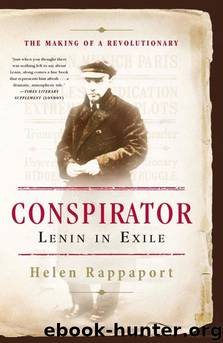Conspirator by Helen Rappaport

Author:Helen Rappaport [Rappaport, Helen]
Language: eng
Format: epub
Publisher: Basic Books
Published: 0101-01-01T00:00:00+00:00
LENIN’S BRIEF WINTER hibernation at rue Marie Rose was interrupted early the following year by more frenetic political squabbles. In January a plenary of the RSDLP was called in Paris. It lasted three long and bitter weeks: “three weeks of agony” as Lenin described it, when “all nerves were on edge, the devil to pay!” The atmosphere was tense as conciliators among Lenin’s Bolsheviks made a last-ditch attempt to bring the various party factions to a degree of unity. Although Lenin was determined to remain at the head of a mainstream Bolshevik party, he now lost control of the party machinery and with it all-important control of Bolshevik funds (including the Shmid inheritance, which was transferred to the neutral control of German social democrats). Worse, demands were made to close down the factional newspaper Proletarii and with it the Bolshevik center in Paris, and transfer operations back to the Central Committee in Russia. The plenary left him bitter and disenchanted and worse—feeling out of touch. “Paris is a rotten hole in many respects,” he wrote to Mariya in Russia. “I am still unable to adapt myself fully to it (after living here for a year!).” Nevertheless, he admitted that “only extraordinary circumstances could drive me back to Geneva!”
During March and April 1910 Lenin attempted a rapprochement with Plekhanov and the Mensheviks but failed. His disillusion was extreme: “Life in exile is now a hundred times harder than it was before the revolution.” With it came nothing but endless “squabbling.” Yet he could not resist returning to the lion’s den of theoretical conflict by accepting another invitation from Gorky to join him on Capri that summer. Perhaps the sunshine and sea air seduced him at a time when he felt weary and discouraged. He spent two weeks on Capri during June-July, traveling south by train to Marseilles where he picked up the steamer for Naples. The sea journey was cheap and evoked memories of home. It was, so he told his brother, “like travelling on the Volga.” By this time Gorky had moved to a larger property—the Villa Spinola near the square on Via Lorgano. Lenin’s visit inevitably provoked endless arguments with Bogdanov and Lunacharsky, who were already on Capri, and much talk of Russia on the terrace every evening after dinner. But there were nevertheless moments of relaxation: games of chess, evenings listening to Russian songs played on Gorky’s phonograph, fishing trips with the old Caprese boat-men, and the diversion provided by the famous Sorrento tenor Giovannino, who came to supper and sang for them, though in error singing the czarist anthem “Bozhe tsarya khrani” (God Save the Czar).
The main reason for the move to the Villa Spinola was that Gorky, Bogdanov, and their colleagues wanted suitable premises for a party school to train young workers as activists. Capri seemed a good location, relatively safe from police surveillance and official scrutiny. The facilities for undertaking such training in Russia had evaporated. With so many arrests, new activists were needed who
Download
This site does not store any files on its server. We only index and link to content provided by other sites. Please contact the content providers to delete copyright contents if any and email us, we'll remove relevant links or contents immediately.
| Africa | Americas |
| Arctic & Antarctica | Asia |
| Australia & Oceania | Europe |
| Middle East | Russia |
| United States | World |
| Ancient Civilizations | Military |
| Historical Study & Educational Resources |
Red Famine: Stalin's War on Ukraine by Anne Applebaum(2908)
Midnight in Chernobyl by Adam Higginbotham(2526)
Chernobyl by Serhii Plokhy(2521)
Midnight in Chernobyl: The Untold Story of the World's Greatest Nuclear Disaster by Adam Higginbotham(2206)
The House of Government by Slezkine Yuri(2187)
Red Shambhala by Andrei Znamenski(2175)
The Gulag Archipelago (Vintage Classics) by Aleksandr Solzhenitsyn(2073)
All the Kremlin's Men by Mikhail Zygar(2058)
Red Notice by Bill Browder(2053)
From Cold War to Hot Peace by Michael McFaul(2022)
Putin's Labyrinth(2007)
From Russia with Lunch by David Smiedt(1956)
The Future Is History by Masha Gessen(1891)
A People's Tragedy by Orlando Figes(1859)
The Romanovs by Simon Sebag Montefiore(1811)
How to Tame a Fox (and Build a Dog): Visionary Scientists and a Siberian Tale of Jump-Started Evolution by Lee Alan Dugatkin & Lyudmila Trut(1756)
The Lost Spy by Andrew Meier(1738)
Putin's Labyrinth: Spies, Murder, and the Dark Heart of the New Russia(1737)
Art and Revolution by John Berger(1711)
